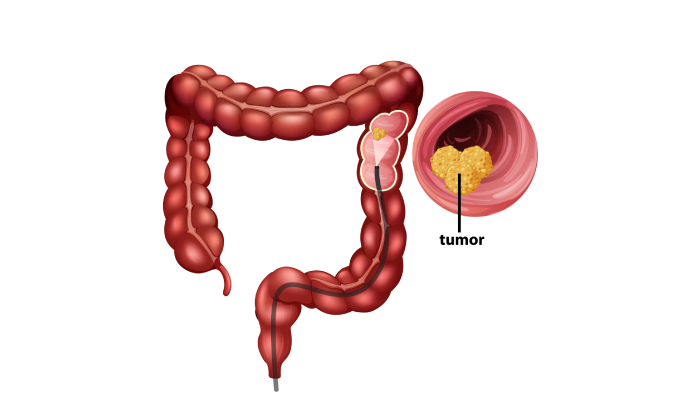Colorectal Cancer: Causes, Risks & Expert Care!
Colon cancer originates in the colon, while rectal cancer begins in the rectum. Together, they are referred to as colorectal cancer. In most cases, colorectal cancer develops from adenomatous (precancerous) polyps, which undergo DNA mutations over time, leading to malignant growth.
Risk factors for colorectal cancer include family history, diet, smoking, alcohol consumption, and inflammatory bowel disease (IBD). Early detection through colonoscopy and timely intervention are crucial for effective treatment.
Consult Dr. Ujwal Zambare, an expert Colorectal Cancer Specialist in Wakad, Pune, for advanced diagnosis, and personalized treatment.

How Does Colorectal Cancer Start?
Some types of polyps can change into cancer over time (usually many years), but not all polyps become cancer. The chance of a polyp turning into cancer depends on the type of polyp it is. There are different types of polyps.
- Adenomatous polyps (adenomas): These polyps sometimes change into cancer. Because of this, adenomas are called a pre-cancerous condition. The 3 types of adenomas are tubular, villous, and tubulovillous.
- Hyperplastic polyps and inflammatory polyps: These polyps are more common, but in general they are not pre-cancerous. Some people with large (more than 1cm) hyperplastic polyps might need colorectal cancer screening with colonoscopy more often.
- Sessile serrated polyps (SSP) and traditional serrated adenomas (TSA): These polyps are often treated like adenomas because they have a higher risk of colorectal cancer.
What Are The Symptoms of Colorectal Cancer?
- Changes in bowel habits
- Diarrhea or constipation
- A feeling that the bowel does not empty properly after a bowel movement
- Blood in feces that makes stools look black
- Bright red blood coming from the rectum
- Pain and bloating in the abdomen
- A feeling of fullness in the abdomen, even after not eating for a while.
- Fatigue or tiredness
- Unexplained weight loss
What Are The Causes of Colorectal Cancer?
- Increasing age is associated with colorectal cancer. The study reveals, 90% of colorectal cancers are diagnosed after the age of 40.
- Consistently and prolonged habit of high fat intake can cause colorectal cancer.
- A history of colorectal cancer and polyps in the family may lead to such disease.
- Large intestine carries polyps for a considerable period may cause colorectal cancer.
- Chronic ulcerative colitis and inflammatory bowel disease can lead to colorectal cancer
What Are The Treatment Options For Colorectal Cancer?
Treatment will depend on several factors, including the size, location, and stage of the cancer, whether or not it is recurrent, and the current overall state of health of the patient. Treatment options include chemotherapy, radiotherapy, and surgery.
- Surgery for colorectal cancer – This is the most common treatment. The affected malignant tumors and any nearby lymph nodes will be removed, to reduce the risk of the cancer spreading. The bowel is usually sewn back together, but sometimes the rectum is removed completely and a colostomy bag is attached for drainage. The colostomy bag collects stools. This is usually a temporary measure, but it may be permanent if it is not possible to join up the ends of the bowel. If the cancer is diagnosed early enough, surgery may successfully remove it. If surgery does not stop the cancer, it will ease the symptoms.
- Chemotherapy – Chemotherapy involves using a medicine or chemical to destroy the cancerous cells. It is commonly used for colon cancer treatment. Before surgery, it may help shrink the tumor. Targeted therapy is a kind of chemotherapy that specifically targets the proteins that encourage the development of some cancers. They may have fewer side effects than other types of chemotherapy. Drugs that may be used for colorectal cancer include bevacizumab (Avastin) and ramucirumab (Cyramza). A study has found that patients with advanced colon cancer who receive chemotherapy and who have a family history of colorectal cancer have a significantly lower likelihood of cancer recurrence and death.
- Radiation therapy – Radiation therapy uses high energy radiation beams to destroy the cancer cells and to prevent them from multiplying. This is more commonly used for rectal cancer treatment. It may be used before surgery in an attempt to shrink the tumor. Both radiation therapy and chemotherapy may be given after surgery to help lower the chances of recurrence.
How Is Colorectal Cancer Diagnosed?
Colorectal cancer can be diagnosed by a variety of tests. This condition can be diagnosed after you show symptoms or if your caregiver finds something during a screening test that is not normal. During the diagnosis process, your doctor may do the following tests:
- Blood tests (Complete blood count, tumor markers and liver enzymes)
- Imaging tests (X-rays, CT scan, MRI scan, PET scan, ultrasound, angiography)
- Biopsy
- Diagnostic colonoscopy (done after you show symptoms, not as a routine screening test)
- Proctoscopy
When to Consult a Doctor?
If you experience persistent changes in bowel habits, rectal bleeding, abdominal pain, unexplained weight loss, or fatigue, it’s essential to seek medical attention. Early detection of colorectal cancer improves treatment outcomes and survival rates. Get treatment for Colorectal related disease from Dr. Ujwal Zambare at True Life Clinic & Wellness Center, Wakad-Pune. Schedule your consultation for advanced screening and personalized treatment.
